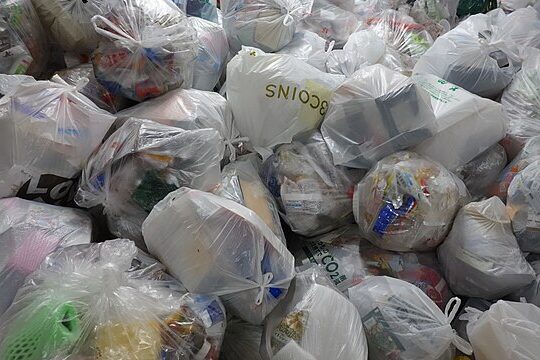
In 2010, Sintawee Sulaiman embarked on her inaugural lab position at the University of Osaka in Japan. Assigned to manipulate and experiment with an enzyme called LCC (leaf-branch compost cutinase), discovered in a heap of decomposing leaves near the university, Sulaiman aimed to explore its potential in degrading plastic.
LCC, originally aiding microbes in breaking down the waxy coating of leaves, intrigued her as a possible solution for plastic degradation.
During one experiment, Sulaiman immersed shards of PET plastic—polyethylene terephthalate, a polymer commonly used in packaging—alongside LCC samples in water overnight. To her amazement, the plastic exhibited a transformative change by morning.
“The piece of plastic had some holes, or some breakdown,” she recalls. “That made me feel so surprised.”
Polymers, long molecular chains tightly woven from smaller units called monomers, constitute the backbone of various materials, including plastics. While enzymes in nature have evolved to break down the chemical bonds of organic materials like cellulose, their exposure to plastics, a relatively recent phenomenon, hindered efficient degradation.
Over the past two decades, scientists have endeavoured to accelerate the evolutionary adaptation of enzymes to plastic, enabling their effective breakdown.
One notable success comes from Professor Alain Marty and his team at the University of Toulouse in France. Over eight years, they meticulously re-engineered LCC into LCCICCG, a specialised PET-degrading enzyme.
This enzyme can now efficiently dismantle PET polymers into their constituent monomers, essential chemicals for crafting new plastic. Marty likens this process to disassembling a pearl necklace.
“We are using an enzyme that you can consider a molecular scissors,” he says. “We break down the link between the pearls, liberate the pearls and in this way, after purification, we can sell these pearls again.”
Marty currently serves as the Chief Scientific Officer at Carbios, a company with a demonstration plant resembling a microbrewery in Clermont-Ferrand, central France. The plant processes PET plastic, including polyester-rich textiles, a major component of global clothing fibres. Typically destined for incineration or landfill, these textiles find a renewed purpose through Carbios’ innovative recycling process.
The demonstration plant employs a large cylindrical reactor and other equipment to process PET plastic, with a special focus on polyester-rich textiles. The processed materials, including shards from plastic bottles and fabric scraps, undergo further treatment to produce soft pellets. These pellets, not requiring 100% PET purity, can incorporate various materials, such as cotton and green-dyed plastics, and handle mixed plastics like food trays.
Carbios plans to significantly expand its operations, aiming to open a factory in northeast France by 2025, capable of recycling 50,000 tonnes of PET waste annually.
Instead of becoming a direct recycler, Carbios intends to license its groundbreaking process to other companies. The company has formed a consortium with major brands like Nestle, L’Oréal, and PepsiCo, ensuring widespread adoption of their technology.
While Carbios faces challenges, such as the higher cost (about 60% more) of producing identical chemical monomers compared to those derived from petrochemicals, it remains at the forefront of PET recycling.
“With time Carbios will get access to more and more feedstock,” says Emmanuel Ladent, Carbios chief executive.
“So the cost of raw materials will go down, because we have access to feedstocks which today are incinerated or go to landfill.”
The company’s approach aligns with a broader push to enhance plastic recycling globally, considering that less than 10% of plastic worldwide is currently recycled.
However, other types of plastic pose greater challenges, and some may prove impossible to recycle.
Carbios is already looking beyond PET and exploring the degradation of plastics with more complex chemical structures, with nylon being a prominent target. As research progresses, the hope is to further mitigate the environmental impact of plastic waste.
“I’m really enthusiastic about the work that Carbios is doing, because they are kind of blazing the trail if you like,” says Prof Andy Pickford, from the Centre for Enzyme Innovation at the University of Portsmouth. “If people can see this works, then hopefully more people will buy into it.”
Sintawee Sulaiman, the researcher who witnessed LCC’s potential in 2010, remains pleased with the progress her enzyme has made, marking a significant step towards sustainable plastic management.
“I feel very lucky to have met LCC,” she says. “And I really hope that it can help the world – to change the world into a better place.”
——————————————————————————
At Natural World Fund, we are passionate about stopping the decline in our wildlife.
The decline in our wildlife is shocking and frightening. Without much more support, many of the animals we know and love will continue in their decline towards extinction.
When you help to restore a patch of degraded land through rewilding to forests, meadows, or wetlands, you have a massive impact on the biodiversity at a local level. You give animals a home and food that they otherwise would not have had, and it has a positive snowball effect on the food chain.
We are convinced that this is much better for the UK than growing lots of fast-growing coniferous trees, solely to remove carbon, that don’t actually help our animals to thrive.
This is why we stand for restoring nature in the UK through responsible rewilding. For us, it is the right thing to do. Let’s do what’s right for nature!
Donate today at https://naturalworldfund.com/ and join in the solution!

